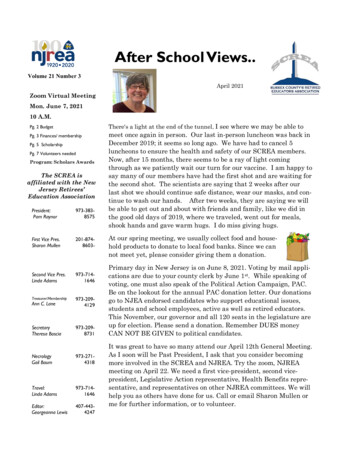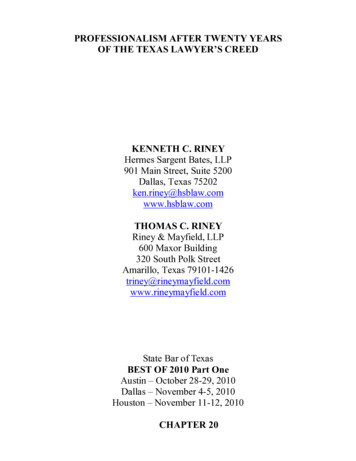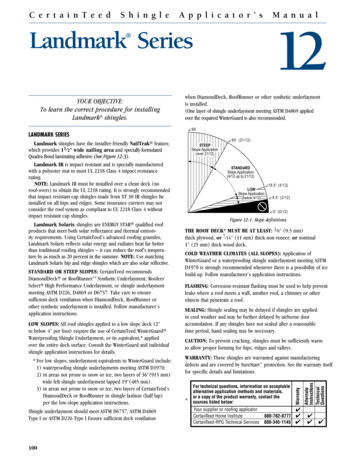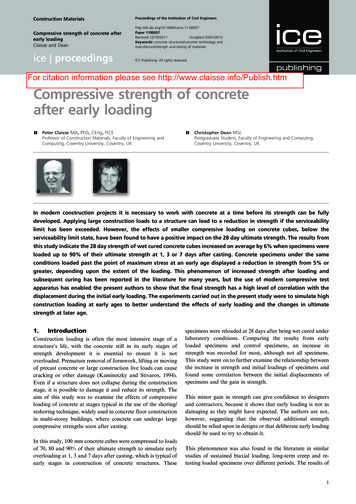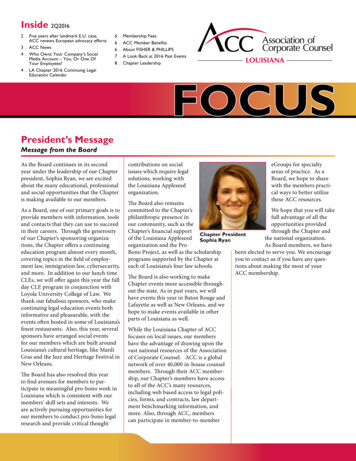
Transcription
Inside 2Q20162. Five years after landmark E.U. case, .ACC renews European advocacy efforts3. ACC News4. Who Owns Your Company’s Social .Media Account – You, Or One Of .Your Employees?4. LA Chapter 2016 Continuing Legal .Education Calendar6. Membership Fees6. ACC Member Benefits6. About FISHER & PHILLIPS7. A Look Back at 2016 Past Events8. Chapter LeadershipFOCUSPresident’s MessageMessage from the BoardAs the Board continues in its secondyear under the leadership of our Chapterpresident, Sophia Ryan, we are excitedabout the many educational, professionaland social opportunities that the Chapteris making available to our members.As a Board, one of our primary goals is toprovide members with information, toolsand contacts that they can use to succeedin their careers. Through the generosityof our Chapter’s sponsoring organizations, the Chapter offers a continuingeducation program almost every month,covering topics in the field of employment law, immigration law, cybersecurity,and more. In addition to our lunch timeCLEs, we will offer again this year the fullday CLE program in conjunction withLoyola University College of Law. Wethank our fabulous sponsors, who makecontinuing legal education events bothinformative and pleasurable, with theevents often hosted in some of Louisiana’sfinest restaurants. Also, this year, severalsponsors have arranged social eventsfor our members which are built aroundLouisiana’s cultural heritage, like MardiGras and the Jazz and Heritage Festival inNew Orleans.The Board has also resolved this yearto find avenues for members to participate in meaningful pro-bono work inLouisiana which is consistent with ourmembers’ skill sets and interests. Weare actively pursuing opportunities forour members to conduct pro-bono legalresearch and provide critical thoughtcontributions on socialissues which require legalsolutions, working withthe Louisiana Appleseedorganization.eGroups for specialtyareas of practice. As aBoard, we hope to sharewith the members practical ways to better utilizethese ACC resources.The Board also remainscommitted to the Chapter’sWe hope that you will takephilanthropic presence infull advantage of all theour community, such as theopportunities providedChapter’s financial supportthrough the Chapter andChapter Presidentof the Louisiana Appleseed Sophia Ryanthe national organization.organization and the ProAs Board members, we haveBono Project, as well as the scholarshipbeen elected to serve you. We encourageprograms supported by the Chapter atyou to contact us if you have any queseach of Louisiana’s four law schools.tions about making the most of yourACC membership.The Board is also working to makeChapter events more accessible throughout the state. As in past years, we willhave events this year in Baton Rouge andLafayette as well as New Orleans, and wehope to make events available in otherparts of Louisiana as well.While the Louisiana Chapter of ACCfocuses on local issues, our membershave the advantage of drawing upon thevast national resources of the Associationof Corporate Counsel. ACC is a globalnetwork of over 40,000 in-house counselmembers. Through their ACC membership, our Chapter’s members have accessto all of the ACC’s many resources,including web based access to legal policies, forms, and contracts, law department benchmarking information, andmore. Also, through ACC, memberscan participate in member-to-member
Five years after landmark E.U. case, ACC renews Europeanadvocacy effortsBy Mary Blatch, Director of Government and Regulatory AffairsHere’s a legal anniversary that seemsto have been all but forgotten: Last fallmarked five years since the EuropeanCourt of Justice’s decision in Akzo NobelChemicals Limited and Ackros ChemicalsLimited v. European Commission. If you’renot familiar with that case, the court heldthat in-house counsel in the EuropeanUnion could not assert privilege overtheir legal advice to company employeesin the context of a competition proceeding before the European Commission.While the decision was not a surprise (itconfirmed case law from 1982), it was adisappointment to the in-house legal community, which had hoped that changes inthe in-house profession might cause thecourt to take a different view.While the five-year anniversary of theAkzo case has not received much attention in the wider legal industry, at ACC,we remembered the pivotal case byretaining a Brussels-based public affairsconsultant to help ACC move the needleon the important issues of in-house counsel role and status and attorney-clientprivilege in Europe.Advocacy on attorney-clientprivilegeThe ACC has been heavily focused onadvocacy supporting the attorney-clientprivilege in the corporate context since itsinception. In the United States, in-housecounsel enjoy the same rights and privileges as their law firm counterparts, butoften face a steeper challenge to maintaining privilege over their communicationof legal advice than do outside counsel.ACC has intervened in countless cases toprotect the ability of in-house counsel toassert attorney-client privilege.In Europe, where the attorney-client privilege is often called the legal professionalprivilege (LPP), ACC has been activeon the issue since the early 2000s, whenEuropean Commissioner Mario Montibegan a campaign of aggressive dawn raidsin competition investigations that did notrespect LPP for in-house counsel communications of legal advice. Even leavingaside the in-house counsel issue, the contours of the LPP vary widely in Europe,but ACC has consistently advocated thatwhatever level of protection is affordedcommunications with outside counselshould also be afforded communicationsfor legal advice with in-house counsel. In Germany, where a 2014 decisionby the Federal Social Court (pensioncourt) had called into question theability of in-house counsel to join theGerman bar associations, legislation was passed in December 2015confirming the ability of in-housecounsel to join the bar and assert LPPunder certain circumstances.When Akzo Nobel Chemicals Limited andAckros Chemicals Limited v. EuropeanCommission raised the in-house privilege issue before the European Court ofJustice, ACC and ACC Europe intervenedin the case in support of the company’sassertion of privilege. When the ECJissued its opinion in September 2010,confirming its position that in-housecounsel legal advice was not privileged(even though the in-house counsel inAkzo was licensed), many were worriedthat the ECJ’s decision would lead to agradual erosion of the LPP that wouldextend beyond European Commissioncompetition proceedings. In Switzerland, there are continuedattempts to introduce a legislative proposal to extend LPP to Swiss in-housecounsel. Although the latest initiativewas voted down in March, the committee examining the proposal recognized the need to address the issue.Developments since Akzoencouraging?In contrast to post-Akzo fear, what hashappened in the five years since the Akzodecision could be considered encouraging, especially with respect to developments at the national level within Europe: In Netherlands, where in-housecounsel may assert privilege if theyare members of the bar, the SupremeCourt of the Netherlands issued aruling in 2013 refusing to follow theAkzo rule and allowing for the assertion of privilege by properly licensedin-house counsel. In Belgium, where there is a separatebar that in-house counsel may joinand gain the right to assert privilege,the highest court rejected the BelgianCompetition Authority’s attempt torely on the Akzo decision to discoverin-house counsel communications.These developments overall are positive,but the majority of in-house counsel inEurope are still without the ability tobecome licensed by a bar associationor to assert LPP over their legal adviceto their employer-client. Moreover,in-house counsel who are licensed andmay assert LPP in their countries arestill unable to do so in E.U. competitionproceedings. Over the next several years,ACC will be working to raise the profileof this issue in Europe and hopefullymove the needle so that more jurisdictions, and ultimately the European Unionrecognize in-house counsel on equalterms to outside attorneys.ACC’s public affairs consultant has beenmeeting with representatives of Europeanbar associations as well as European business associations to introduce them toACC and the importance of LPP in thebusiness world. ACC is highlighting theadvantages that LPP offers in terms ofencouraging robust corporate compliance,as well as the disadvantages that Europeancompanies suffer from lack of in-houseprivilege when they are litigating againstcompanies that can assert privilege overin-house legal advice. We see the LPP as akey issue, not only to our European members, but to any member whose practiceinvolves the European Union.continued on page 32 Louisiana Chapter FOCUS 2Q16
continued from page 2Foreign privilege – U.S. problemU.S. attorneys are sometimes surprised tolearn of the unequal status many of theirEuropean counterparts are subject tounder E.U. and national European laws.They may be even more surprised if theylearn of this unequal status in the midstof an international dispute where theirEuropean in-house colleagues have provided written advice that is now subject todiscovery in U.S. courts.Such disclosure of legal advice from foreign in-house counsel is not just a theoretical possibility. For example, in Anwarv. Fairfield Greenwich Ltd, No. 09 Civ. 118(S.D.N.Y. July 8, 2013), plaintiffs deposeddefendant’s Dutch in-house lawyer, anddefendant’s counsel instructed the Dutchlawyer not to answer certain questionson the basis of attorney-client privilege.On a motion to compel the answers, thecourt held that because the Dutch lawyerwas not licensed in the Netherlands, hewas not entitled to assert attorney-clientprivilege. In the case of Veleron Holding,B.V. v. BNP Paribas SA, 2014 WL 4184806(S.D.N.Y. Aug. 22, 2014), defendantMorgan Stanley was able to compeldisclosure of plaintiff ’s communicationswith in-house counsel in the Netherlandsand Russia, because neither lawyer waslicensed or able to assert a privilege intheir home jurisdictions.The privilege laws of other countries canhave quite an impact on the legal interests of U.S. companies and their in-housecounsel, especially when it comes tolitigation involving foreign subsidiaries.This is because when dealing with issuesof attorney-client privilege and foreignattorneys, U.S. courts will follow a foreigncountry’s privilege rules if the communication at issue “touches base” with thatcountry – i.e., the foreign country has themost direct and compelling interest indetermining whether the communicationis privileged. This analysis often resultsin foreign privilege rules applying to communications advising on foreign legalissues. When the foreign jurisdiction’srules for in-house counsel differ from theU.S. rules, disclosure often is the result.Towards uniformityOne of the reasons cited by the Akzo decision for not recognizing LPP for in-housecounsel was that lack of privilege for inhouse counsel was the dominant nationalpractice among E.U. member states. Thus,the lack of in-house LPP at the E.U. levelis connected to the lack of in-house LPPat the national level in Europe. ACC ispursuing a strategy to raise the profileof the LPP issue at the E.U. level whilealso supporting national-level efforts toimprove the status of in-house counseland extend LPP to them. This will be along-term advocacy and education effort,but one of utmost importance to the inhouse profession globally.As legal systems in developing economiescontinue to evolve, the issue of in-housecounsel privilege may begin to be reconsidered outside of Europe as well. If thereis a preference among more developedeconomies for allowing in-house counselto assert LPP, that may lead to more jurisdictions choosing to follow the practice aswell. The more jurisdictions that recognizethe value of in-house counsel legal adviceand protect it accordingly, the better forthe in-house legal profession worldwide.If you have a story about how international legal privilege rules have affectedyour practice or your company, we’d love tohear from you. Please contact Mary Blatch,ACC’s director of government and regulatory affairs at m.blatch@acc.com.ACC NewsACC Annual Meeting:Exclusively for In-house CounselAttend the ACC Annual Meeting(October 16-19, San Francisco, CA), thelargest gathering of in-house counseland an unparalleled value in legaleducation. In less than three days youcan choose from over 100 substantivesessions to fulfill your annual CLE/CPD requirements, meet leading legalservice providers and network with yourin-house peers from around the world.This meeting is the event that you cannotafford to miss. Register today for bestselection of programs. Visit am.acc.com.Mind Your BusinessTo become a trusted advisor for businessexecutives, it’s imperative for in-housecounsel to understand the businessoperations of your company. Attend thesebusiness education courses offered byACC and the Boston University QuestromSchool of Business to learn critical businessdisciplines and earn valuable CLE credits: Mini MBA for In-house Counsel,September 13-15, November 2-4 Project Management for the In-houseLaw Department, November 7-8Learn more and register at www.acc.com/businessedu.New to In-house? Are youprepared?The ACC Corporate Counsel University (June 12–14, San Diego, CA), combinespractical fundamentals with careerbuilding opportunities, which will helpyou excel in your in-house role. Cometo this unrivaled event to gain valuableinsights from experienced in-housecounsel, earn CLE/CPD credits (includingethics credits and specialty credits) andbuild relationships and expand yournetwork of peers. Register at ccu.acc.com.continued on page 43
continued from page 3Share the WealthWhen your in-house peers join ACC,you create opportunities to engage withcolleagues, expand your professionalnetwork, and share ideas and expertise.When you recruit a new ACC member,you are automatically entered into amonthly drawing to win a US 200 giftcard! As an added bonus, your newrecruit is automatically entered into adrawing to win a US 100 gift card whenthey join! Contest ends September 30.Visit http://www.acc.com/membership/recruit.cfm for more information.ACC Alliance Partner Jordan Lawrence hasintroduced a Vendor Risk AssessmentSMservice that defensibly automates andorganizes the third-party vendor diligenceand risk management process. JordanLawrence leverages proven technology toslash the time and cost required to ensureyour company is protected from one ofyour most vulnerable risk areas: thirdparty vendors. For more information, visitwww.jordanlawrence.com.find the information you need to provideconfident answers. Designed by in-housecounsel, General Counsel NAVIGATOR (GCN) allows you to pinpoint practicalanswers across a wide-range of topicswithin a single platform. ACC Memberscan choose a complimentary add-onproduct when you purchase a base GCNsubscription. For more information, visitwww.wolterskluwerlb.com/gcn or call1-877-347-6108.Wolters Kluwer Legal & Regulatory U.S.offers comprehensive legal resources andtools so you and your team can efficientlyWho Owns Your Company’s Social Media Account – You, Or OneOf Your Employees?By Arthur Lambert, Fisher & Phillips, LLCAfter Simms left the company, CDMwanted the group contact switched overto one of its current employees. It alsodemanded that Simms relinquish anynames, addresses, conversations, etc., garnered from the LinkedIn account. Simmsrefused to turn over the information.group account was not nailed down bythe company in any agreement or policyit had relating to Simms or any otheremployee. If the company had createdsome concrete proof of ownership, theunresolved factual issues described by thejudge’s opinion would not exist.Other Cases Starting To CropUpWhile the last few years have seen a slewof litigation about these issues, there hasbeen a scarcity of reported decisions bycourts. One such decision is a recentfederal court opinion from Illinois in thecase of CDM Media USA, Inc. v. Simms.Although the court’s decision doesn’tsettle any issues, it does highlight someimportant steps you can take to safeguardyour information.CDM sued Simms for breach of contract, misappropriation, and violationof the state’s trade secret act. The exemployee responded by asserting thatthe company had no property rights tothe information. He claimed that he wasnot contractually required to transfer theinformation because transfer of controlof the LinkedIn group was not covered bythe confidentiality provision in his noncompete agreement. He also argued thatthe LinkedIn group account and pertinentcommunications did not fall under thestate’s trade secrets act, and thus were notsubject to a claim under that statute.Control Of LinkedIn Group InQuestionLack Of Definitive AgreementLed To ConfusionWhen Robert Simms was an employeeof CDM, a marketing and media servicescompany, he was the contact person fora special LinkedIn group started by thecompany containing its customers andpotential customers.Simms filed a motion to dismiss, askingthe court to toss out the claim. The judgesplit the baby on the motion but essentially left all causes of action intact. Inmaking his ruling, the judge noted thatthe ownership or control of the LinkedInTuesday, 12th April 2016Employers have been asking an importantquestion with more frequency in recenttimes: who owns the company’s socialmedia account – the employer or theemployee running the account?Business social media accounts oftencontain a lot of pertinent and valuableinformation, and unfettered access to thataccount could give a departing employee afast head start towards competing with you.The CDM case is not the only case of itskind that provides guidance for employers on how to best protect your socialmedia accounts. There have been otherlawsuits where at least part of the legalclaim at issue is ownership of a companysocial media account.In a California case, a Twitter feed wasfound to be company property becauseof the time and expense the companyput into developing and maintaining theaccount (PhoneDog v. Kravitz). Also, in aNew York case, a court held that a socialmedia account was owned by the company due to a written agreement whichprovided for ownership (Ardis Health,LLC v. Nankivell).Lessons To Be LearnedAt the very least, you should develop asocial media policy that addresses issuescontinued on page 54 Louisiana Chapter FOCUS 2Q16
continued from page 4including retention of company socialmedia accounts, account information,and communications. You should ensurethat all of your employees sign the policy.As part of the policy, make clear that anyposting on company social media is theproperty of the company along with theaccounts, the names, etc., associated withthe accounts.Further, the policy should clearly statethat when an employee leaves, all accountinformation and communications areto be transferred back to the company.Further, the policy should describe what,if any, information you consider to beconfidential. This way, when an employeeleaves, the account information stays withyour company.Of course, if you have an employmentagreement, you should consider includingthese provisions in the “Confidentiality”section and inserting a clause requiringthe return of all information and cooperation in the transfer of any companyaccounts. This will at least let youremployees know where they stand if theyleave the company and will provide youwith extra ammunition to keep yourinformation where it belongs.Final WarningBefore finalizing any policy, you needto keep in mind that several states haveenacted statutes that limit the interception and monitoring of social media.Laws are different across state lines, buta typical one can be found in California,where you are prohibited from requiringor requesting employe
Loyola University College of Law. We thank our fabulous sponsors, who make continuing legal education events both informative and pleasurable, with the events often hosted in some of Louisiana’s finest restaurants.
